The Impact of Self Efficacy on Performance: A Comprehensive Report
VerifiedAdded on 2020/02/19
|13
|3979
|43
Report
AI Summary
This report delves into the concept of self-efficacy, defining it as an individual's belief in their ability to succeed in specific tasks. It explores the importance of self-efficacy in both personal and professional contexts, particularly within the IT sector, highlighting its impact on employee performance, motivation, and goal achievement. The report identifies key contributing factors to self-efficacy, including past performance, vicarious experiences, emotional cues, and verbal persuasion. A literature review examines existing research on self-efficacy and its relation to technology adoption and workplace dynamics. The report emphasizes the positive relationship between self-efficacy and work performance, providing insights into how individuals can enhance their self-confidence and achieve their goals.

SELF EFFICACY
1
1
Paraphrase This Document
Need a fresh take? Get an instant paraphrase of this document with our AI Paraphraser
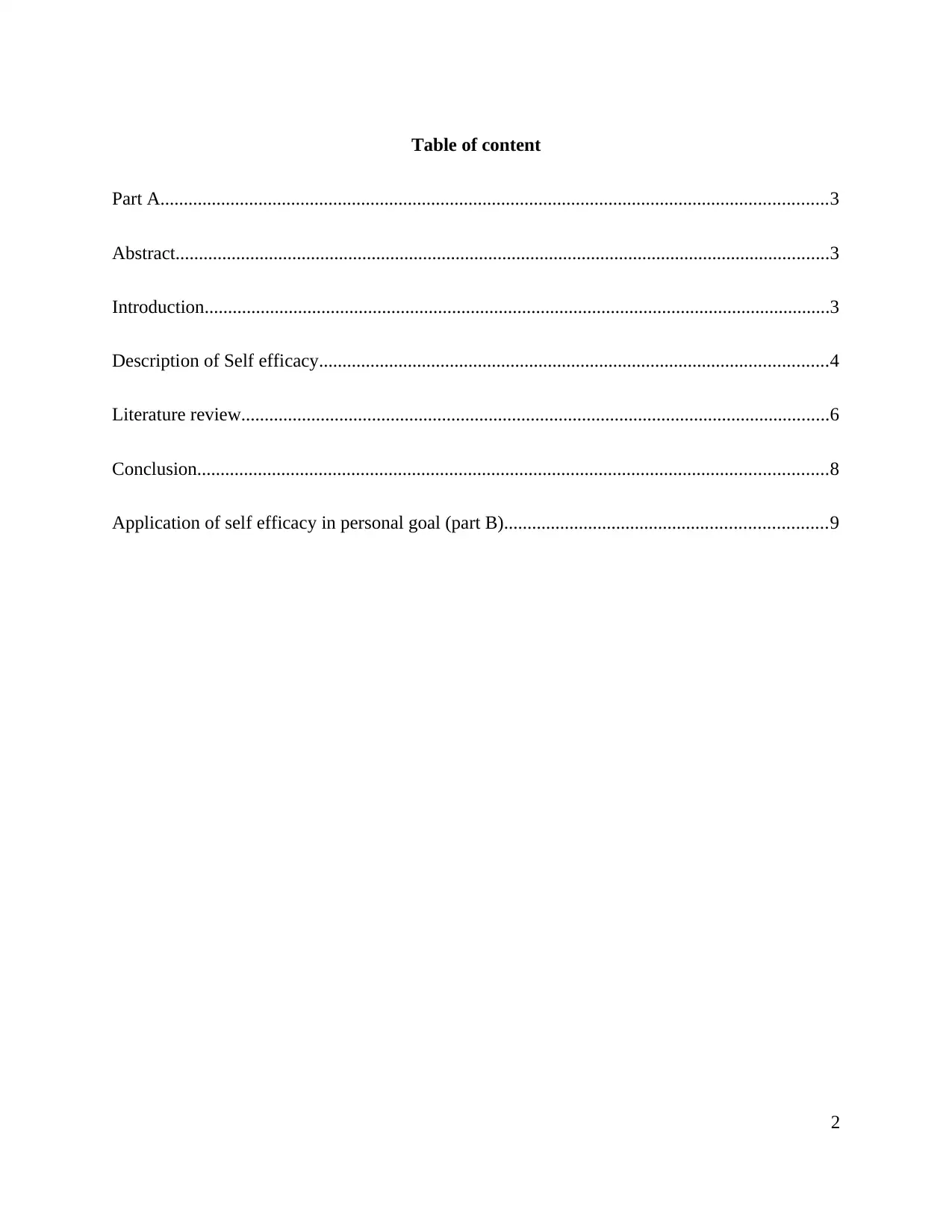
Table of content
Part A...............................................................................................................................................3
Abstract............................................................................................................................................3
Introduction......................................................................................................................................3
Description of Self efficacy.............................................................................................................4
Literature review..............................................................................................................................6
Conclusion.......................................................................................................................................8
Application of self efficacy in personal goal (part B).....................................................................9
2
Part A...............................................................................................................................................3
Abstract............................................................................................................................................3
Introduction......................................................................................................................................3
Description of Self efficacy.............................................................................................................4
Literature review..............................................................................................................................6
Conclusion.......................................................................................................................................8
Application of self efficacy in personal goal (part B).....................................................................9
2
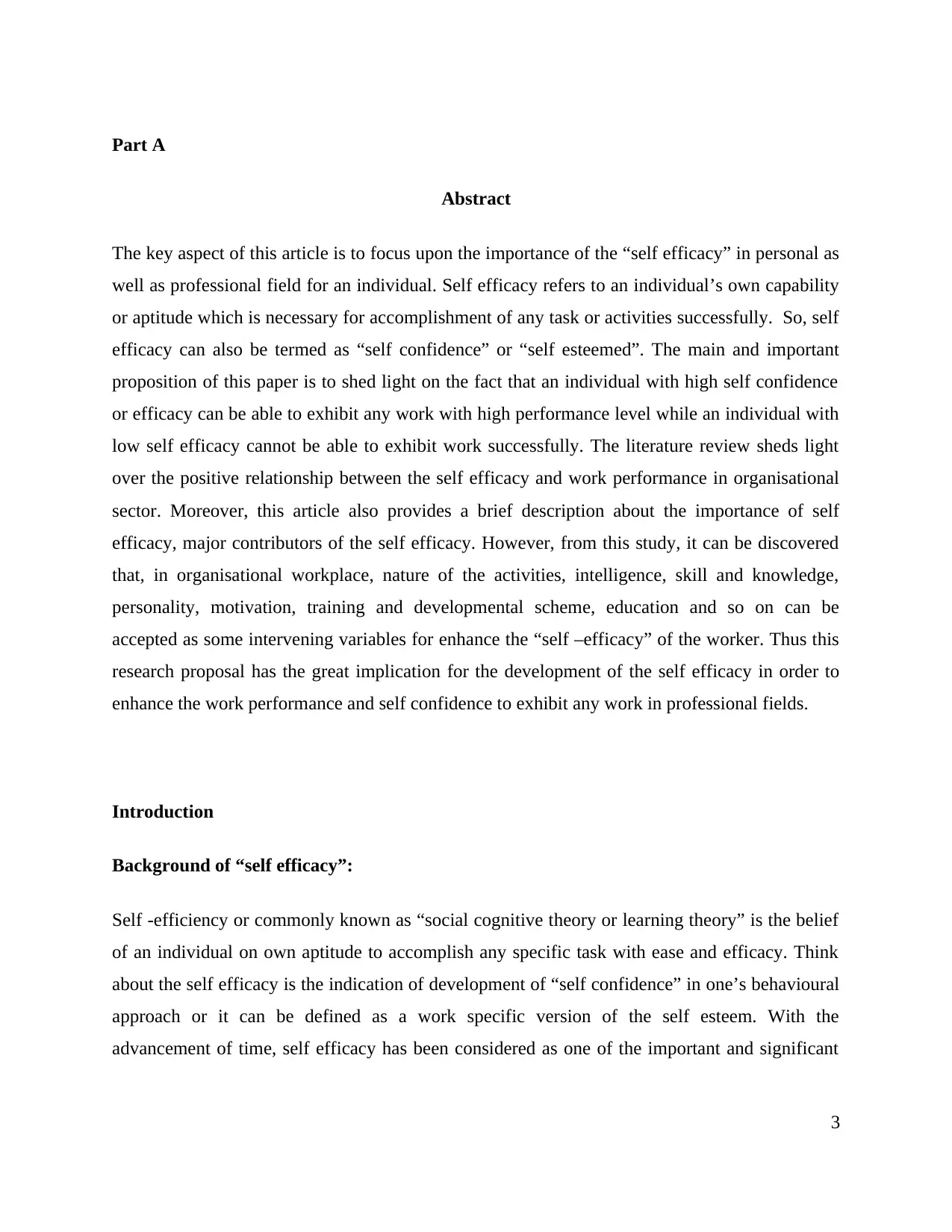
Part A
Abstract
The key aspect of this article is to focus upon the importance of the “self efficacy” in personal as
well as professional field for an individual. Self efficacy refers to an individual’s own capability
or aptitude which is necessary for accomplishment of any task or activities successfully. So, self
efficacy can also be termed as “self confidence” or “self esteemed”. The main and important
proposition of this paper is to shed light on the fact that an individual with high self confidence
or efficacy can be able to exhibit any work with high performance level while an individual with
low self efficacy cannot be able to exhibit work successfully. The literature review sheds light
over the positive relationship between the self efficacy and work performance in organisational
sector. Moreover, this article also provides a brief description about the importance of self
efficacy, major contributors of the self efficacy. However, from this study, it can be discovered
that, in organisational workplace, nature of the activities, intelligence, skill and knowledge,
personality, motivation, training and developmental scheme, education and so on can be
accepted as some intervening variables for enhance the “self –efficacy” of the worker. Thus this
research proposal has the great implication for the development of the self efficacy in order to
enhance the work performance and self confidence to exhibit any work in professional fields.
Introduction
Background of “self efficacy”:
Self -efficiency or commonly known as “social cognitive theory or learning theory” is the belief
of an individual on own aptitude to accomplish any specific task with ease and efficacy. Think
about the self efficacy is the indication of development of “self confidence” in one’s behavioural
approach or it can be defined as a work specific version of the self esteem. With the
advancement of time, self efficacy has been considered as one of the important and significant
3
Abstract
The key aspect of this article is to focus upon the importance of the “self efficacy” in personal as
well as professional field for an individual. Self efficacy refers to an individual’s own capability
or aptitude which is necessary for accomplishment of any task or activities successfully. So, self
efficacy can also be termed as “self confidence” or “self esteemed”. The main and important
proposition of this paper is to shed light on the fact that an individual with high self confidence
or efficacy can be able to exhibit any work with high performance level while an individual with
low self efficacy cannot be able to exhibit work successfully. The literature review sheds light
over the positive relationship between the self efficacy and work performance in organisational
sector. Moreover, this article also provides a brief description about the importance of self
efficacy, major contributors of the self efficacy. However, from this study, it can be discovered
that, in organisational workplace, nature of the activities, intelligence, skill and knowledge,
personality, motivation, training and developmental scheme, education and so on can be
accepted as some intervening variables for enhance the “self –efficacy” of the worker. Thus this
research proposal has the great implication for the development of the self efficacy in order to
enhance the work performance and self confidence to exhibit any work in professional fields.
Introduction
Background of “self efficacy”:
Self -efficiency or commonly known as “social cognitive theory or learning theory” is the belief
of an individual on own aptitude to accomplish any specific task with ease and efficacy. Think
about the self efficacy is the indication of development of “self confidence” in one’s behavioural
approach or it can be defined as a work specific version of the self esteem. With the
advancement of time, self efficacy has been considered as one of the important and significant
3
⊘ This is a preview!⊘
Do you want full access?
Subscribe today to unlock all pages.

Trusted by 1+ million students worldwide
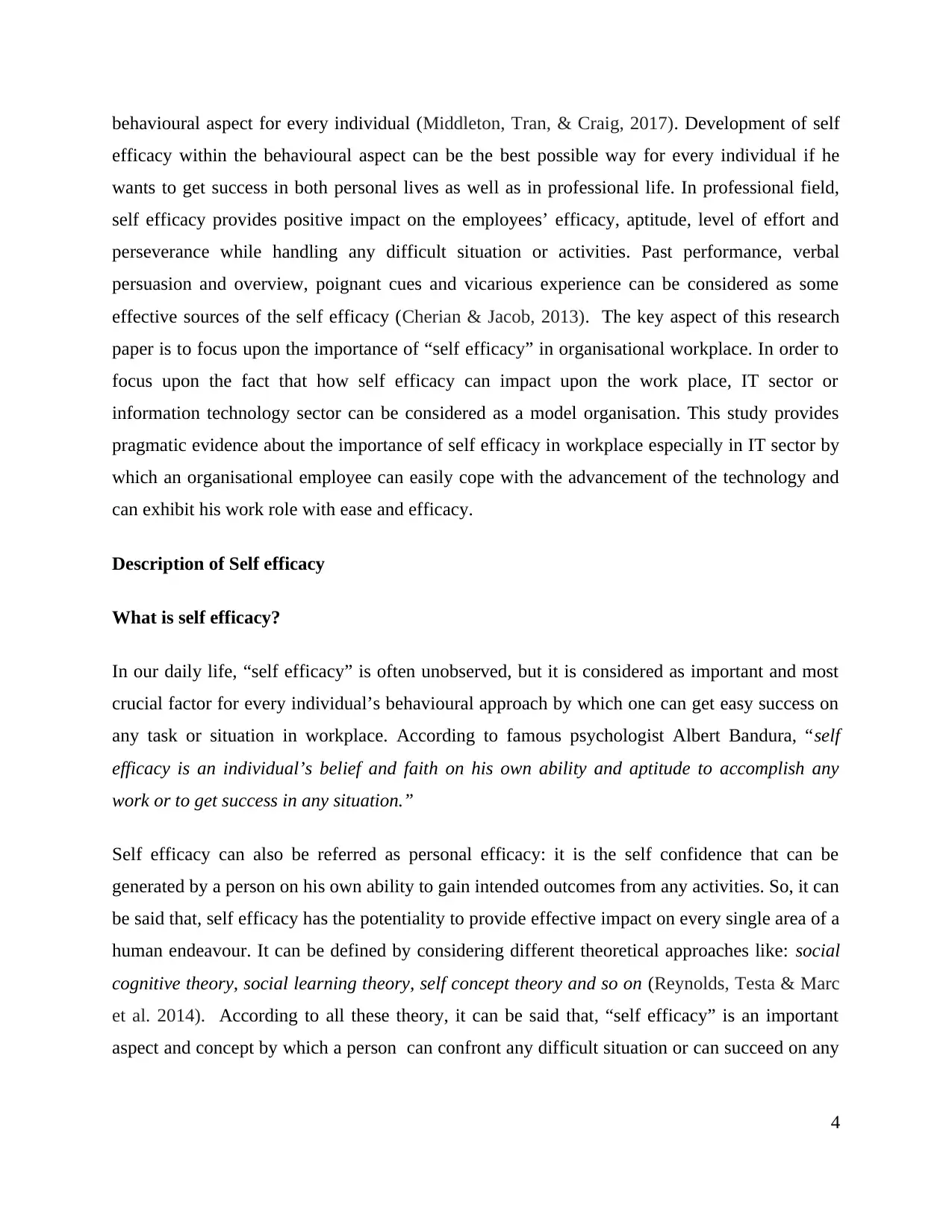
behavioural aspect for every individual (Middleton, Tran, & Craig, 2017). Development of self
efficacy within the behavioural aspect can be the best possible way for every individual if he
wants to get success in both personal lives as well as in professional life. In professional field,
self efficacy provides positive impact on the employees’ efficacy, aptitude, level of effort and
perseverance while handling any difficult situation or activities. Past performance, verbal
persuasion and overview, poignant cues and vicarious experience can be considered as some
effective sources of the self efficacy (Cherian & Jacob, 2013). The key aspect of this research
paper is to focus upon the importance of “self efficacy” in organisational workplace. In order to
focus upon the fact that how self efficacy can impact upon the work place, IT sector or
information technology sector can be considered as a model organisation. This study provides
pragmatic evidence about the importance of self efficacy in workplace especially in IT sector by
which an organisational employee can easily cope with the advancement of the technology and
can exhibit his work role with ease and efficacy.
Description of Self efficacy
What is self efficacy?
In our daily life, “self efficacy” is often unobserved, but it is considered as important and most
crucial factor for every individual’s behavioural approach by which one can get easy success on
any task or situation in workplace. According to famous psychologist Albert Bandura, “self
efficacy is an individual’s belief and faith on his own ability and aptitude to accomplish any
work or to get success in any situation.”
Self efficacy can also be referred as personal efficacy: it is the self confidence that can be
generated by a person on his own ability to gain intended outcomes from any activities. So, it can
be said that, self efficacy has the potentiality to provide effective impact on every single area of a
human endeavour. It can be defined by considering different theoretical approaches like: social
cognitive theory, social learning theory, self concept theory and so on (Reynolds, Testa & Marc
et al. 2014). According to all these theory, it can be said that, “self efficacy” is an important
aspect and concept by which a person can confront any difficult situation or can succeed on any
4
efficacy within the behavioural aspect can be the best possible way for every individual if he
wants to get success in both personal lives as well as in professional life. In professional field,
self efficacy provides positive impact on the employees’ efficacy, aptitude, level of effort and
perseverance while handling any difficult situation or activities. Past performance, verbal
persuasion and overview, poignant cues and vicarious experience can be considered as some
effective sources of the self efficacy (Cherian & Jacob, 2013). The key aspect of this research
paper is to focus upon the importance of “self efficacy” in organisational workplace. In order to
focus upon the fact that how self efficacy can impact upon the work place, IT sector or
information technology sector can be considered as a model organisation. This study provides
pragmatic evidence about the importance of self efficacy in workplace especially in IT sector by
which an organisational employee can easily cope with the advancement of the technology and
can exhibit his work role with ease and efficacy.
Description of Self efficacy
What is self efficacy?
In our daily life, “self efficacy” is often unobserved, but it is considered as important and most
crucial factor for every individual’s behavioural approach by which one can get easy success on
any task or situation in workplace. According to famous psychologist Albert Bandura, “self
efficacy is an individual’s belief and faith on his own ability and aptitude to accomplish any
work or to get success in any situation.”
Self efficacy can also be referred as personal efficacy: it is the self confidence that can be
generated by a person on his own ability to gain intended outcomes from any activities. So, it can
be said that, self efficacy has the potentiality to provide effective impact on every single area of a
human endeavour. It can be defined by considering different theoretical approaches like: social
cognitive theory, social learning theory, self concept theory and so on (Reynolds, Testa & Marc
et al. 2014). According to all these theory, it can be said that, “self efficacy” is an important
aspect and concept by which a person can confront any difficult situation or can succeed on any
4
Paraphrase This Document
Need a fresh take? Get an instant paraphrase of this document with our AI Paraphraser
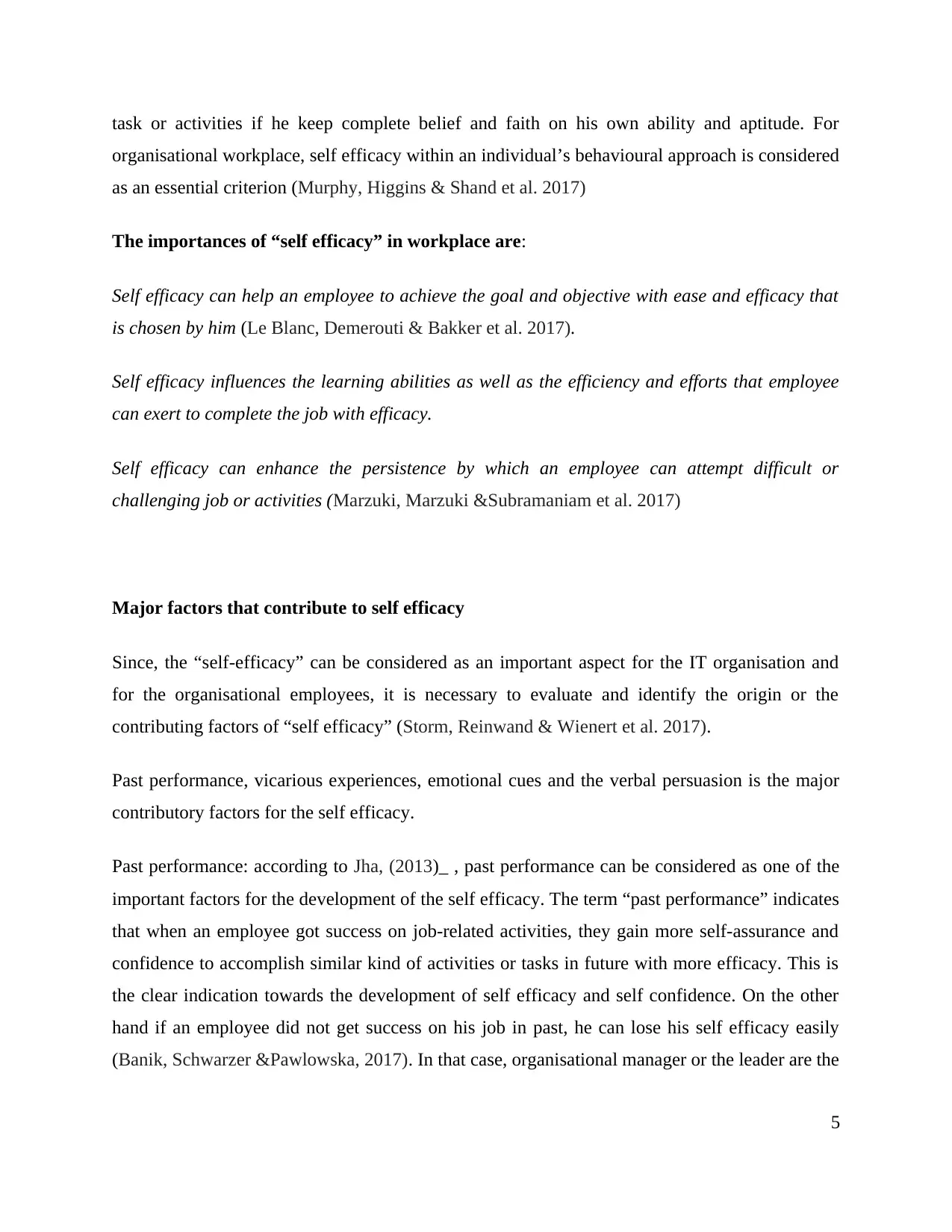
task or activities if he keep complete belief and faith on his own ability and aptitude. For
organisational workplace, self efficacy within an individual’s behavioural approach is considered
as an essential criterion (Murphy, Higgins & Shand et al. 2017)
The importances of “self efficacy” in workplace are:
Self efficacy can help an employee to achieve the goal and objective with ease and efficacy that
is chosen by him (Le Blanc, Demerouti & Bakker et al. 2017).
Self efficacy influences the learning abilities as well as the efficiency and efforts that employee
can exert to complete the job with efficacy.
Self efficacy can enhance the persistence by which an employee can attempt difficult or
challenging job or activities (Marzuki, Marzuki &Subramaniam et al. 2017)
Major factors that contribute to self efficacy
Since, the “self-efficacy” can be considered as an important aspect for the IT organisation and
for the organisational employees, it is necessary to evaluate and identify the origin or the
contributing factors of “self efficacy” (Storm, Reinwand & Wienert et al. 2017).
Past performance, vicarious experiences, emotional cues and the verbal persuasion is the major
contributory factors for the self efficacy.
Past performance: according to Jha, (2013)_ , past performance can be considered as one of the
important factors for the development of the self efficacy. The term “past performance” indicates
that when an employee got success on job-related activities, they gain more self-assurance and
confidence to accomplish similar kind of activities or tasks in future with more efficacy. This is
the clear indication towards the development of self efficacy and self confidence. On the other
hand if an employee did not get success on his job in past, he can lose his self efficacy easily
(Banik, Schwarzer &Pawlowska, 2017). In that case, organisational manager or the leader are the
5
organisational workplace, self efficacy within an individual’s behavioural approach is considered
as an essential criterion (Murphy, Higgins & Shand et al. 2017)
The importances of “self efficacy” in workplace are:
Self efficacy can help an employee to achieve the goal and objective with ease and efficacy that
is chosen by him (Le Blanc, Demerouti & Bakker et al. 2017).
Self efficacy influences the learning abilities as well as the efficiency and efforts that employee
can exert to complete the job with efficacy.
Self efficacy can enhance the persistence by which an employee can attempt difficult or
challenging job or activities (Marzuki, Marzuki &Subramaniam et al. 2017)
Major factors that contribute to self efficacy
Since, the “self-efficacy” can be considered as an important aspect for the IT organisation and
for the organisational employees, it is necessary to evaluate and identify the origin or the
contributing factors of “self efficacy” (Storm, Reinwand & Wienert et al. 2017).
Past performance, vicarious experiences, emotional cues and the verbal persuasion is the major
contributory factors for the self efficacy.
Past performance: according to Jha, (2013)_ , past performance can be considered as one of the
important factors for the development of the self efficacy. The term “past performance” indicates
that when an employee got success on job-related activities, they gain more self-assurance and
confidence to accomplish similar kind of activities or tasks in future with more efficacy. This is
the clear indication towards the development of self efficacy and self confidence. On the other
hand if an employee did not get success on his job in past, he can lose his self efficacy easily
(Banik, Schwarzer &Pawlowska, 2017). In that case, organisational manager or the leader are the
5
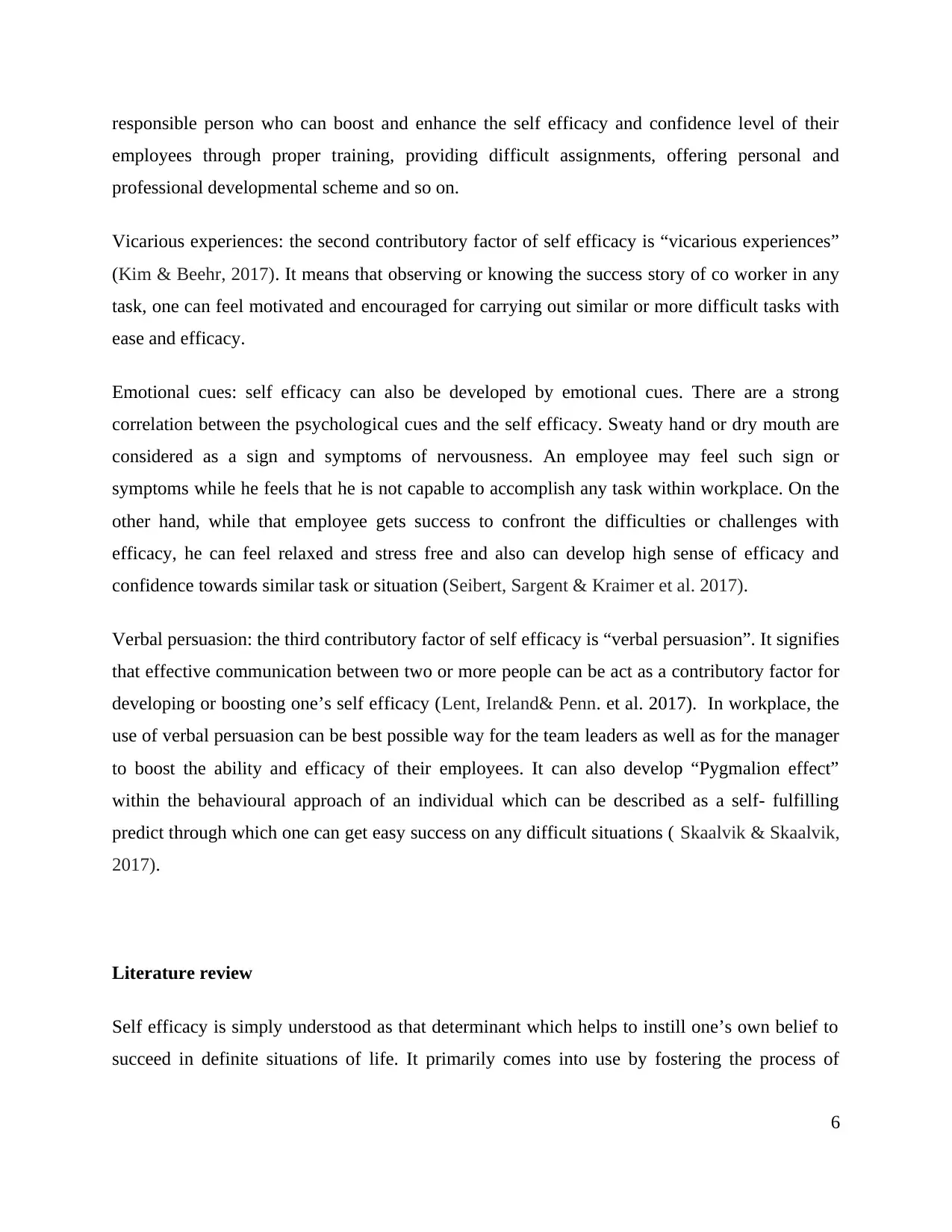
responsible person who can boost and enhance the self efficacy and confidence level of their
employees through proper training, providing difficult assignments, offering personal and
professional developmental scheme and so on.
Vicarious experiences: the second contributory factor of self efficacy is “vicarious experiences”
(Kim & Beehr, 2017). It means that observing or knowing the success story of co worker in any
task, one can feel motivated and encouraged for carrying out similar or more difficult tasks with
ease and efficacy.
Emotional cues: self efficacy can also be developed by emotional cues. There are a strong
correlation between the psychological cues and the self efficacy. Sweaty hand or dry mouth are
considered as a sign and symptoms of nervousness. An employee may feel such sign or
symptoms while he feels that he is not capable to accomplish any task within workplace. On the
other hand, while that employee gets success to confront the difficulties or challenges with
efficacy, he can feel relaxed and stress free and also can develop high sense of efficacy and
confidence towards similar task or situation (Seibert, Sargent & Kraimer et al. 2017).
Verbal persuasion: the third contributory factor of self efficacy is “verbal persuasion”. It signifies
that effective communication between two or more people can be act as a contributory factor for
developing or boosting one’s self efficacy (Lent, Ireland& Penn. et al. 2017). In workplace, the
use of verbal persuasion can be best possible way for the team leaders as well as for the manager
to boost the ability and efficacy of their employees. It can also develop “Pygmalion effect”
within the behavioural approach of an individual which can be described as a self- fulfilling
predict through which one can get easy success on any difficult situations ( Skaalvik & Skaalvik,
2017).
Literature review
Self efficacy is simply understood as that determinant which helps to instill one’s own belief to
succeed in definite situations of life. It primarily comes into use by fostering the process of
6
employees through proper training, providing difficult assignments, offering personal and
professional developmental scheme and so on.
Vicarious experiences: the second contributory factor of self efficacy is “vicarious experiences”
(Kim & Beehr, 2017). It means that observing or knowing the success story of co worker in any
task, one can feel motivated and encouraged for carrying out similar or more difficult tasks with
ease and efficacy.
Emotional cues: self efficacy can also be developed by emotional cues. There are a strong
correlation between the psychological cues and the self efficacy. Sweaty hand or dry mouth are
considered as a sign and symptoms of nervousness. An employee may feel such sign or
symptoms while he feels that he is not capable to accomplish any task within workplace. On the
other hand, while that employee gets success to confront the difficulties or challenges with
efficacy, he can feel relaxed and stress free and also can develop high sense of efficacy and
confidence towards similar task or situation (Seibert, Sargent & Kraimer et al. 2017).
Verbal persuasion: the third contributory factor of self efficacy is “verbal persuasion”. It signifies
that effective communication between two or more people can be act as a contributory factor for
developing or boosting one’s self efficacy (Lent, Ireland& Penn. et al. 2017). In workplace, the
use of verbal persuasion can be best possible way for the team leaders as well as for the manager
to boost the ability and efficacy of their employees. It can also develop “Pygmalion effect”
within the behavioural approach of an individual which can be described as a self- fulfilling
predict through which one can get easy success on any difficult situations ( Skaalvik & Skaalvik,
2017).
Literature review
Self efficacy is simply understood as that determinant which helps to instill one’s own belief to
succeed in definite situations of life. It primarily comes into use by fostering the process of
6
⊘ This is a preview!⊘
Do you want full access?
Subscribe today to unlock all pages.

Trusted by 1+ million students worldwide
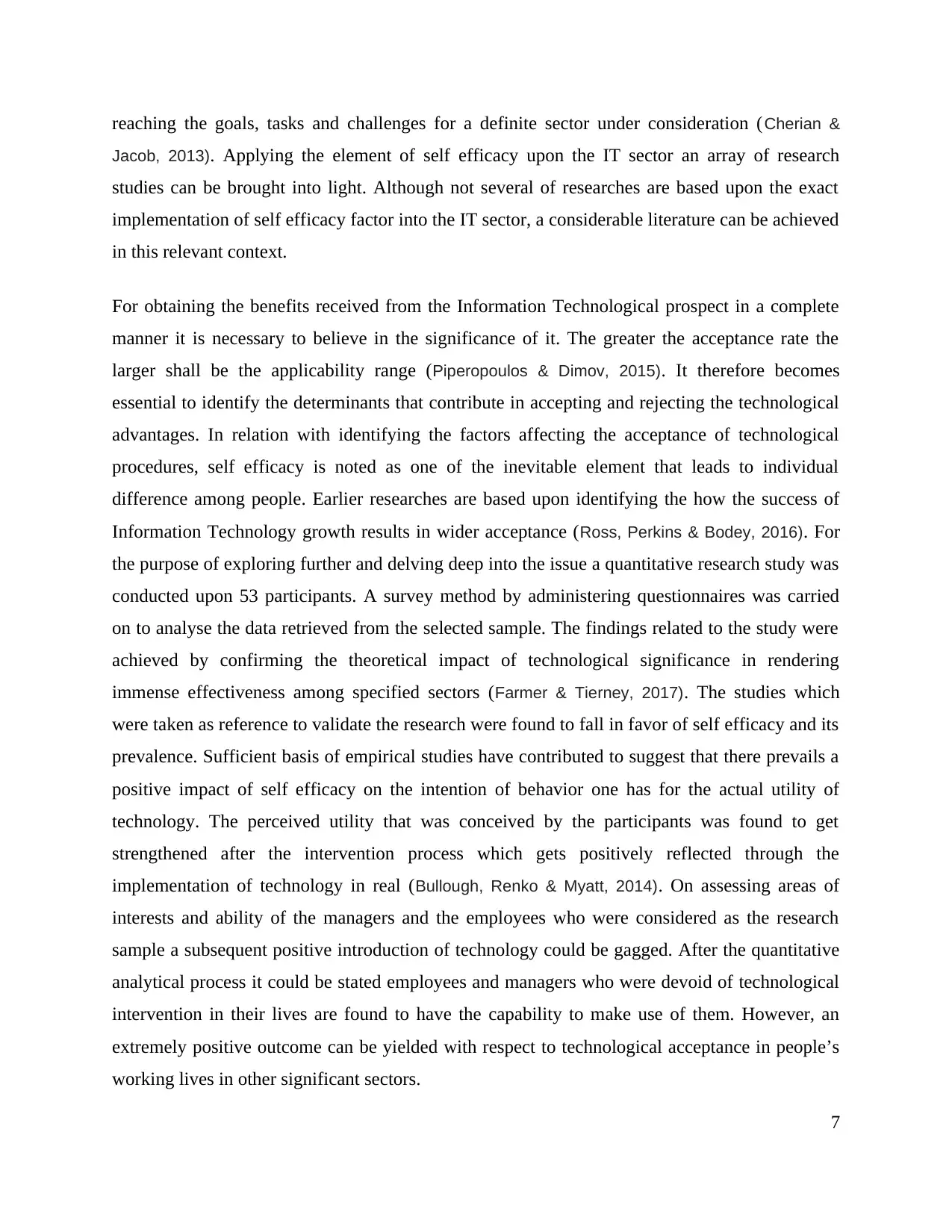
reaching the goals, tasks and challenges for a definite sector under consideration (Cherian &
Jacob, 2013). Applying the element of self efficacy upon the IT sector an array of research
studies can be brought into light. Although not several of researches are based upon the exact
implementation of self efficacy factor into the IT sector, a considerable literature can be achieved
in this relevant context.
For obtaining the benefits received from the Information Technological prospect in a complete
manner it is necessary to believe in the significance of it. The greater the acceptance rate the
larger shall be the applicability range (Piperopoulos & Dimov, 2015). It therefore becomes
essential to identify the determinants that contribute in accepting and rejecting the technological
advantages. In relation with identifying the factors affecting the acceptance of technological
procedures, self efficacy is noted as one of the inevitable element that leads to individual
difference among people. Earlier researches are based upon identifying the how the success of
Information Technology growth results in wider acceptance (Ross, Perkins & Bodey, 2016). For
the purpose of exploring further and delving deep into the issue a quantitative research study was
conducted upon 53 participants. A survey method by administering questionnaires was carried
on to analyse the data retrieved from the selected sample. The findings related to the study were
achieved by confirming the theoretical impact of technological significance in rendering
immense effectiveness among specified sectors (Farmer & Tierney, 2017). The studies which
were taken as reference to validate the research were found to fall in favor of self efficacy and its
prevalence. Sufficient basis of empirical studies have contributed to suggest that there prevails a
positive impact of self efficacy on the intention of behavior one has for the actual utility of
technology. The perceived utility that was conceived by the participants was found to get
strengthened after the intervention process which gets positively reflected through the
implementation of technology in real (Bullough, Renko & Myatt, 2014). On assessing areas of
interests and ability of the managers and the employees who were considered as the research
sample a subsequent positive introduction of technology could be gagged. After the quantitative
analytical process it could be stated employees and managers who were devoid of technological
intervention in their lives are found to have the capability to make use of them. However, an
extremely positive outcome can be yielded with respect to technological acceptance in people’s
working lives in other significant sectors.
7
Jacob, 2013). Applying the element of self efficacy upon the IT sector an array of research
studies can be brought into light. Although not several of researches are based upon the exact
implementation of self efficacy factor into the IT sector, a considerable literature can be achieved
in this relevant context.
For obtaining the benefits received from the Information Technological prospect in a complete
manner it is necessary to believe in the significance of it. The greater the acceptance rate the
larger shall be the applicability range (Piperopoulos & Dimov, 2015). It therefore becomes
essential to identify the determinants that contribute in accepting and rejecting the technological
advantages. In relation with identifying the factors affecting the acceptance of technological
procedures, self efficacy is noted as one of the inevitable element that leads to individual
difference among people. Earlier researches are based upon identifying the how the success of
Information Technology growth results in wider acceptance (Ross, Perkins & Bodey, 2016). For
the purpose of exploring further and delving deep into the issue a quantitative research study was
conducted upon 53 participants. A survey method by administering questionnaires was carried
on to analyse the data retrieved from the selected sample. The findings related to the study were
achieved by confirming the theoretical impact of technological significance in rendering
immense effectiveness among specified sectors (Farmer & Tierney, 2017). The studies which
were taken as reference to validate the research were found to fall in favor of self efficacy and its
prevalence. Sufficient basis of empirical studies have contributed to suggest that there prevails a
positive impact of self efficacy on the intention of behavior one has for the actual utility of
technology. The perceived utility that was conceived by the participants was found to get
strengthened after the intervention process which gets positively reflected through the
implementation of technology in real (Bullough, Renko & Myatt, 2014). On assessing areas of
interests and ability of the managers and the employees who were considered as the research
sample a subsequent positive introduction of technology could be gagged. After the quantitative
analytical process it could be stated employees and managers who were devoid of technological
intervention in their lives are found to have the capability to make use of them. However, an
extremely positive outcome can be yielded with respect to technological acceptance in people’s
working lives in other significant sectors.
7
Paraphrase This Document
Need a fresh take? Get an instant paraphrase of this document with our AI Paraphraser
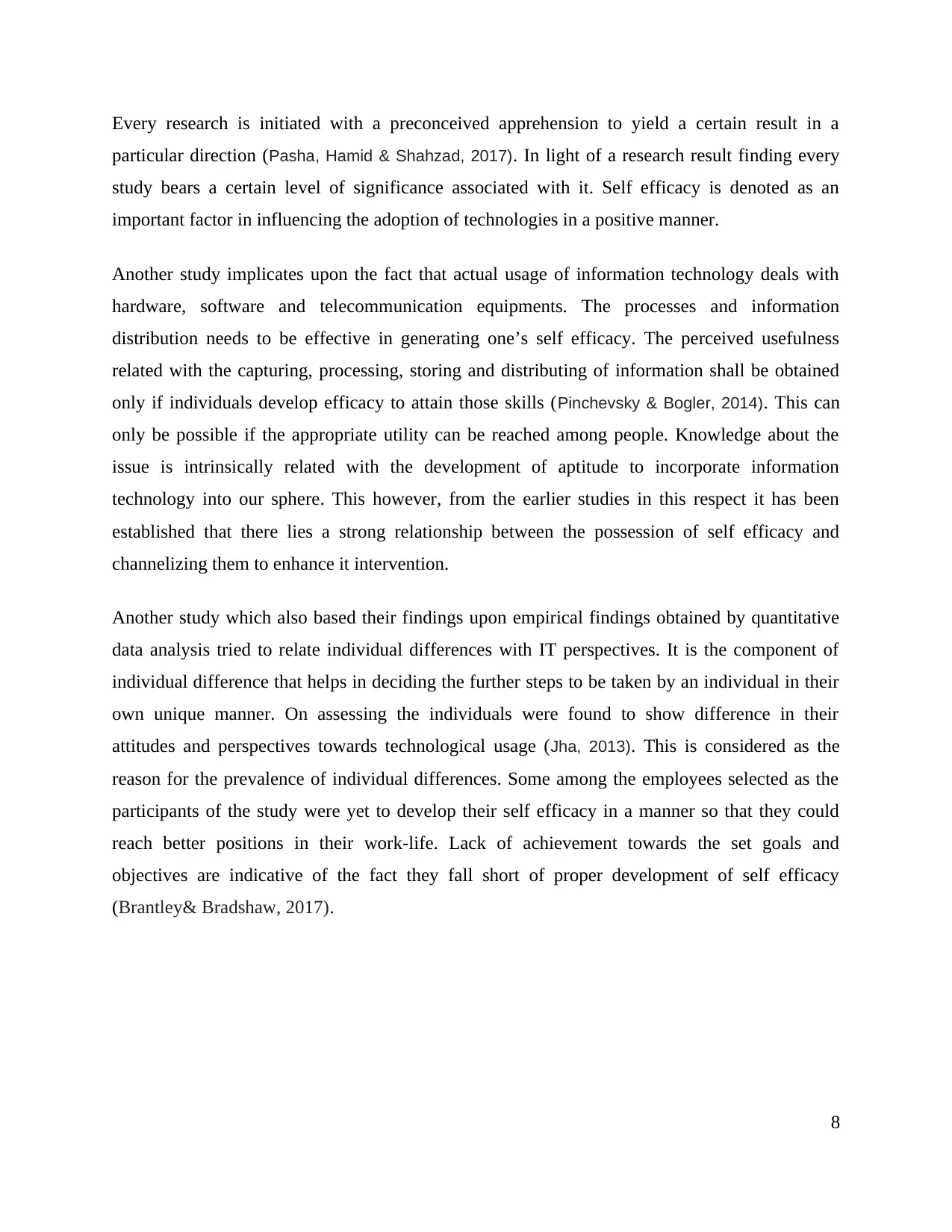
Every research is initiated with a preconceived apprehension to yield a certain result in a
particular direction (Pasha, Hamid & Shahzad, 2017). In light of a research result finding every
study bears a certain level of significance associated with it. Self efficacy is denoted as an
important factor in influencing the adoption of technologies in a positive manner.
Another study implicates upon the fact that actual usage of information technology deals with
hardware, software and telecommunication equipments. The processes and information
distribution needs to be effective in generating one’s self efficacy. The perceived usefulness
related with the capturing, processing, storing and distributing of information shall be obtained
only if individuals develop efficacy to attain those skills (Pinchevsky & Bogler, 2014). This can
only be possible if the appropriate utility can be reached among people. Knowledge about the
issue is intrinsically related with the development of aptitude to incorporate information
technology into our sphere. This however, from the earlier studies in this respect it has been
established that there lies a strong relationship between the possession of self efficacy and
channelizing them to enhance it intervention.
Another study which also based their findings upon empirical findings obtained by quantitative
data analysis tried to relate individual differences with IT perspectives. It is the component of
individual difference that helps in deciding the further steps to be taken by an individual in their
own unique manner. On assessing the individuals were found to show difference in their
attitudes and perspectives towards technological usage (Jha, 2013). This is considered as the
reason for the prevalence of individual differences. Some among the employees selected as the
participants of the study were yet to develop their self efficacy in a manner so that they could
reach better positions in their work-life. Lack of achievement towards the set goals and
objectives are indicative of the fact they fall short of proper development of self efficacy
(Brantley& Bradshaw, 2017).
8
particular direction (Pasha, Hamid & Shahzad, 2017). In light of a research result finding every
study bears a certain level of significance associated with it. Self efficacy is denoted as an
important factor in influencing the adoption of technologies in a positive manner.
Another study implicates upon the fact that actual usage of information technology deals with
hardware, software and telecommunication equipments. The processes and information
distribution needs to be effective in generating one’s self efficacy. The perceived usefulness
related with the capturing, processing, storing and distributing of information shall be obtained
only if individuals develop efficacy to attain those skills (Pinchevsky & Bogler, 2014). This can
only be possible if the appropriate utility can be reached among people. Knowledge about the
issue is intrinsically related with the development of aptitude to incorporate information
technology into our sphere. This however, from the earlier studies in this respect it has been
established that there lies a strong relationship between the possession of self efficacy and
channelizing them to enhance it intervention.
Another study which also based their findings upon empirical findings obtained by quantitative
data analysis tried to relate individual differences with IT perspectives. It is the component of
individual difference that helps in deciding the further steps to be taken by an individual in their
own unique manner. On assessing the individuals were found to show difference in their
attitudes and perspectives towards technological usage (Jha, 2013). This is considered as the
reason for the prevalence of individual differences. Some among the employees selected as the
participants of the study were yet to develop their self efficacy in a manner so that they could
reach better positions in their work-life. Lack of achievement towards the set goals and
objectives are indicative of the fact they fall short of proper development of self efficacy
(Brantley& Bradshaw, 2017).
8
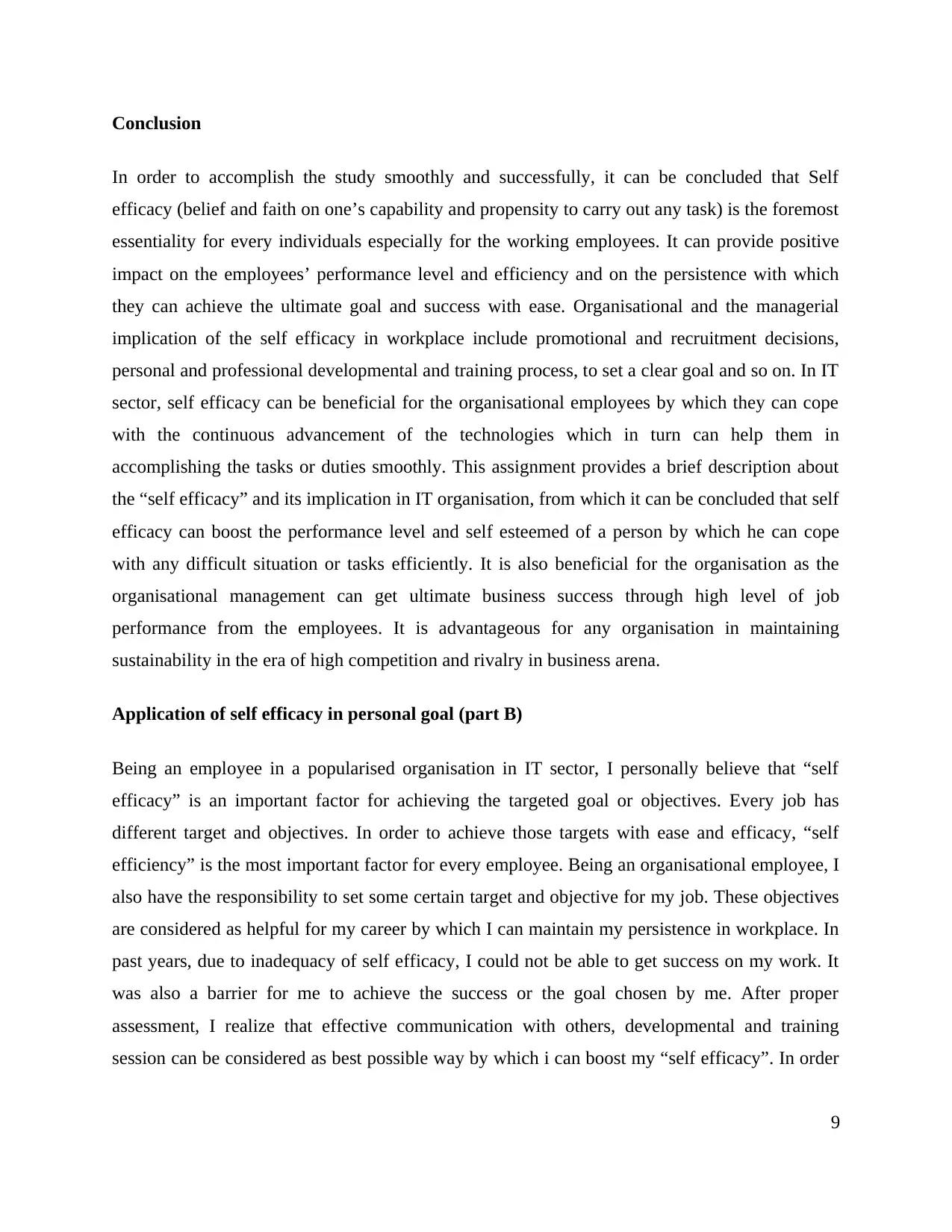
Conclusion
In order to accomplish the study smoothly and successfully, it can be concluded that Self
efficacy (belief and faith on one’s capability and propensity to carry out any task) is the foremost
essentiality for every individuals especially for the working employees. It can provide positive
impact on the employees’ performance level and efficiency and on the persistence with which
they can achieve the ultimate goal and success with ease. Organisational and the managerial
implication of the self efficacy in workplace include promotional and recruitment decisions,
personal and professional developmental and training process, to set a clear goal and so on. In IT
sector, self efficacy can be beneficial for the organisational employees by which they can cope
with the continuous advancement of the technologies which in turn can help them in
accomplishing the tasks or duties smoothly. This assignment provides a brief description about
the “self efficacy” and its implication in IT organisation, from which it can be concluded that self
efficacy can boost the performance level and self esteemed of a person by which he can cope
with any difficult situation or tasks efficiently. It is also beneficial for the organisation as the
organisational management can get ultimate business success through high level of job
performance from the employees. It is advantageous for any organisation in maintaining
sustainability in the era of high competition and rivalry in business arena.
Application of self efficacy in personal goal (part B)
Being an employee in a popularised organisation in IT sector, I personally believe that “self
efficacy” is an important factor for achieving the targeted goal or objectives. Every job has
different target and objectives. In order to achieve those targets with ease and efficacy, “self
efficiency” is the most important factor for every employee. Being an organisational employee, I
also have the responsibility to set some certain target and objective for my job. These objectives
are considered as helpful for my career by which I can maintain my persistence in workplace. In
past years, due to inadequacy of self efficacy, I could not be able to get success on my work. It
was also a barrier for me to achieve the success or the goal chosen by me. After proper
assessment, I realize that effective communication with others, developmental and training
session can be considered as best possible way by which i can boost my “self efficacy”. In order
9
In order to accomplish the study smoothly and successfully, it can be concluded that Self
efficacy (belief and faith on one’s capability and propensity to carry out any task) is the foremost
essentiality for every individuals especially for the working employees. It can provide positive
impact on the employees’ performance level and efficiency and on the persistence with which
they can achieve the ultimate goal and success with ease. Organisational and the managerial
implication of the self efficacy in workplace include promotional and recruitment decisions,
personal and professional developmental and training process, to set a clear goal and so on. In IT
sector, self efficacy can be beneficial for the organisational employees by which they can cope
with the continuous advancement of the technologies which in turn can help them in
accomplishing the tasks or duties smoothly. This assignment provides a brief description about
the “self efficacy” and its implication in IT organisation, from which it can be concluded that self
efficacy can boost the performance level and self esteemed of a person by which he can cope
with any difficult situation or tasks efficiently. It is also beneficial for the organisation as the
organisational management can get ultimate business success through high level of job
performance from the employees. It is advantageous for any organisation in maintaining
sustainability in the era of high competition and rivalry in business arena.
Application of self efficacy in personal goal (part B)
Being an employee in a popularised organisation in IT sector, I personally believe that “self
efficacy” is an important factor for achieving the targeted goal or objectives. Every job has
different target and objectives. In order to achieve those targets with ease and efficacy, “self
efficiency” is the most important factor for every employee. Being an organisational employee, I
also have the responsibility to set some certain target and objective for my job. These objectives
are considered as helpful for my career by which I can maintain my persistence in workplace. In
past years, due to inadequacy of self efficacy, I could not be able to get success on my work. It
was also a barrier for me to achieve the success or the goal chosen by me. After proper
assessment, I realize that effective communication with others, developmental and training
session can be considered as best possible way by which i can boost my “self efficacy”. In order
9
⊘ This is a preview!⊘
Do you want full access?
Subscribe today to unlock all pages.

Trusted by 1+ million students worldwide
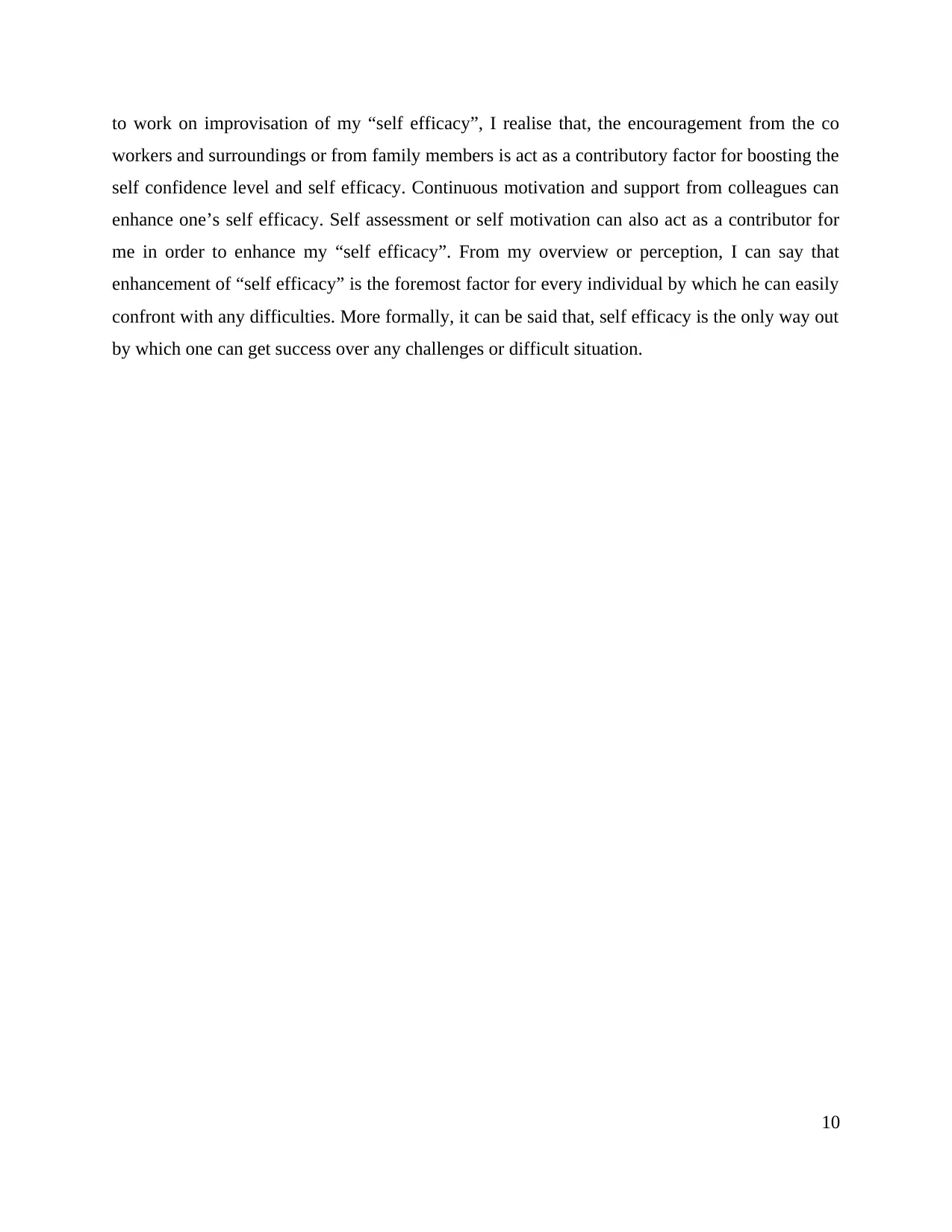
to work on improvisation of my “self efficacy”, I realise that, the encouragement from the co
workers and surroundings or from family members is act as a contributory factor for boosting the
self confidence level and self efficacy. Continuous motivation and support from colleagues can
enhance one’s self efficacy. Self assessment or self motivation can also act as a contributor for
me in order to enhance my “self efficacy”. From my overview or perception, I can say that
enhancement of “self efficacy” is the foremost factor for every individual by which he can easily
confront with any difficulties. More formally, it can be said that, self efficacy is the only way out
by which one can get success over any challenges or difficult situation.
10
workers and surroundings or from family members is act as a contributory factor for boosting the
self confidence level and self efficacy. Continuous motivation and support from colleagues can
enhance one’s self efficacy. Self assessment or self motivation can also act as a contributor for
me in order to enhance my “self efficacy”. From my overview or perception, I can say that
enhancement of “self efficacy” is the foremost factor for every individual by which he can easily
confront with any difficulties. More formally, it can be said that, self efficacy is the only way out
by which one can get success over any challenges or difficult situation.
10
Paraphrase This Document
Need a fresh take? Get an instant paraphrase of this document with our AI Paraphraser
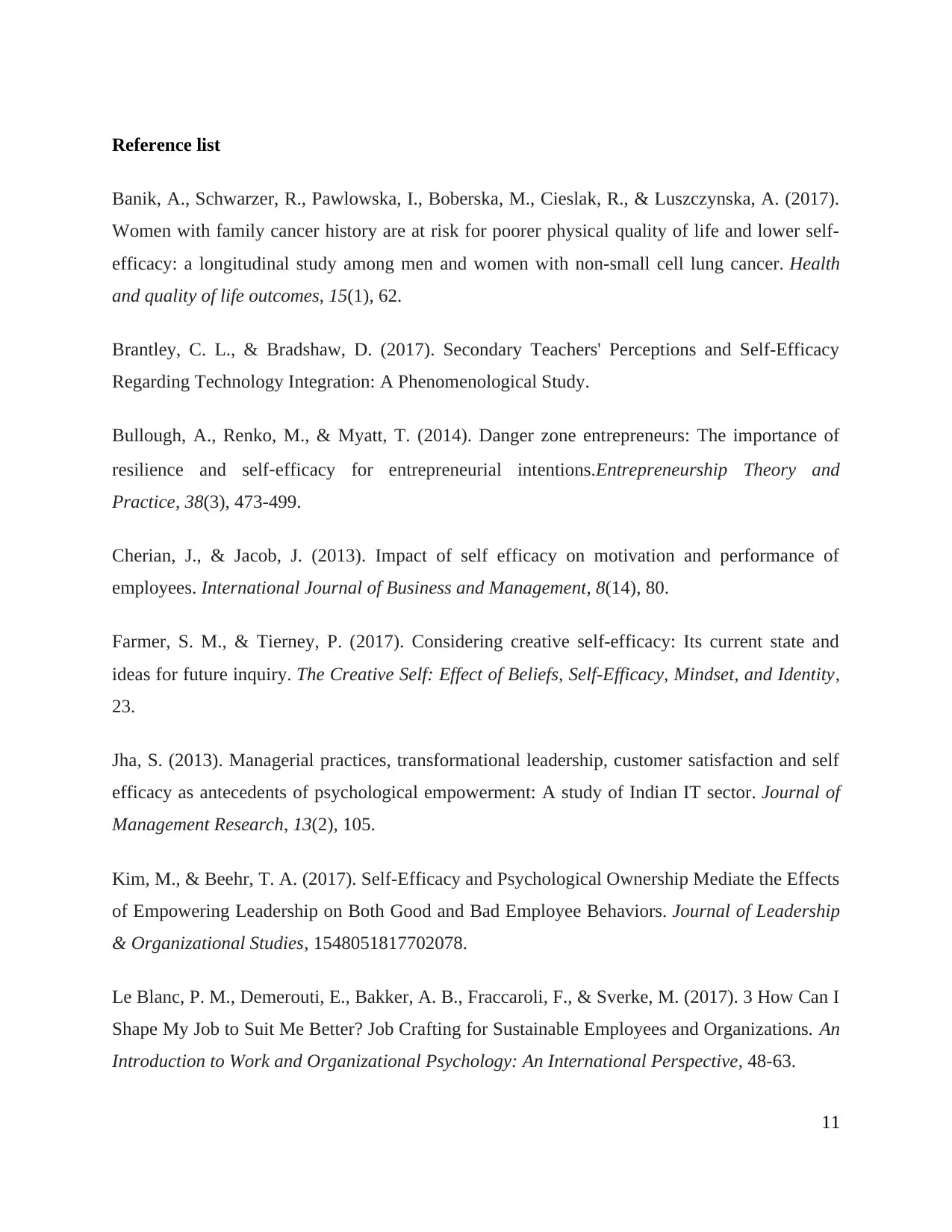
Reference list
Banik, A., Schwarzer, R., Pawlowska, I., Boberska, M., Cieslak, R., & Luszczynska, A. (2017).
Women with family cancer history are at risk for poorer physical quality of life and lower self-
efficacy: a longitudinal study among men and women with non-small cell lung cancer. Health
and quality of life outcomes, 15(1), 62.
Brantley, C. L., & Bradshaw, D. (2017). Secondary Teachers' Perceptions and Self-Efficacy
Regarding Technology Integration: A Phenomenological Study.
Bullough, A., Renko, M., & Myatt, T. (2014). Danger zone entrepreneurs: The importance of
resilience and self‐efficacy for entrepreneurial intentions.Entrepreneurship Theory and
Practice, 38(3), 473-499.
Cherian, J., & Jacob, J. (2013). Impact of self efficacy on motivation and performance of
employees. International Journal of Business and Management, 8(14), 80.
Farmer, S. M., & Tierney, P. (2017). Considering creative self-efficacy: Its current state and
ideas for future inquiry. The Creative Self: Effect of Beliefs, Self-Efficacy, Mindset, and Identity,
23.
Jha, S. (2013). Managerial practices, transformational leadership, customer satisfaction and self
efficacy as antecedents of psychological empowerment: A study of Indian IT sector. Journal of
Management Research, 13(2), 105.
Kim, M., & Beehr, T. A. (2017). Self-Efficacy and Psychological Ownership Mediate the Effects
of Empowering Leadership on Both Good and Bad Employee Behaviors. Journal of Leadership
& Organizational Studies, 1548051817702078.
Le Blanc, P. M., Demerouti, E., Bakker, A. B., Fraccaroli, F., & Sverke, M. (2017). 3 How Can I
Shape My Job to Suit Me Better? Job Crafting for Sustainable Employees and Organizations. An
Introduction to Work and Organizational Psychology: An International Perspective, 48-63.
11
Banik, A., Schwarzer, R., Pawlowska, I., Boberska, M., Cieslak, R., & Luszczynska, A. (2017).
Women with family cancer history are at risk for poorer physical quality of life and lower self-
efficacy: a longitudinal study among men and women with non-small cell lung cancer. Health
and quality of life outcomes, 15(1), 62.
Brantley, C. L., & Bradshaw, D. (2017). Secondary Teachers' Perceptions and Self-Efficacy
Regarding Technology Integration: A Phenomenological Study.
Bullough, A., Renko, M., & Myatt, T. (2014). Danger zone entrepreneurs: The importance of
resilience and self‐efficacy for entrepreneurial intentions.Entrepreneurship Theory and
Practice, 38(3), 473-499.
Cherian, J., & Jacob, J. (2013). Impact of self efficacy on motivation and performance of
employees. International Journal of Business and Management, 8(14), 80.
Farmer, S. M., & Tierney, P. (2017). Considering creative self-efficacy: Its current state and
ideas for future inquiry. The Creative Self: Effect of Beliefs, Self-Efficacy, Mindset, and Identity,
23.
Jha, S. (2013). Managerial practices, transformational leadership, customer satisfaction and self
efficacy as antecedents of psychological empowerment: A study of Indian IT sector. Journal of
Management Research, 13(2), 105.
Kim, M., & Beehr, T. A. (2017). Self-Efficacy and Psychological Ownership Mediate the Effects
of Empowering Leadership on Both Good and Bad Employee Behaviors. Journal of Leadership
& Organizational Studies, 1548051817702078.
Le Blanc, P. M., Demerouti, E., Bakker, A. B., Fraccaroli, F., & Sverke, M. (2017). 3 How Can I
Shape My Job to Suit Me Better? Job Crafting for Sustainable Employees and Organizations. An
Introduction to Work and Organizational Psychology: An International Perspective, 48-63.
11
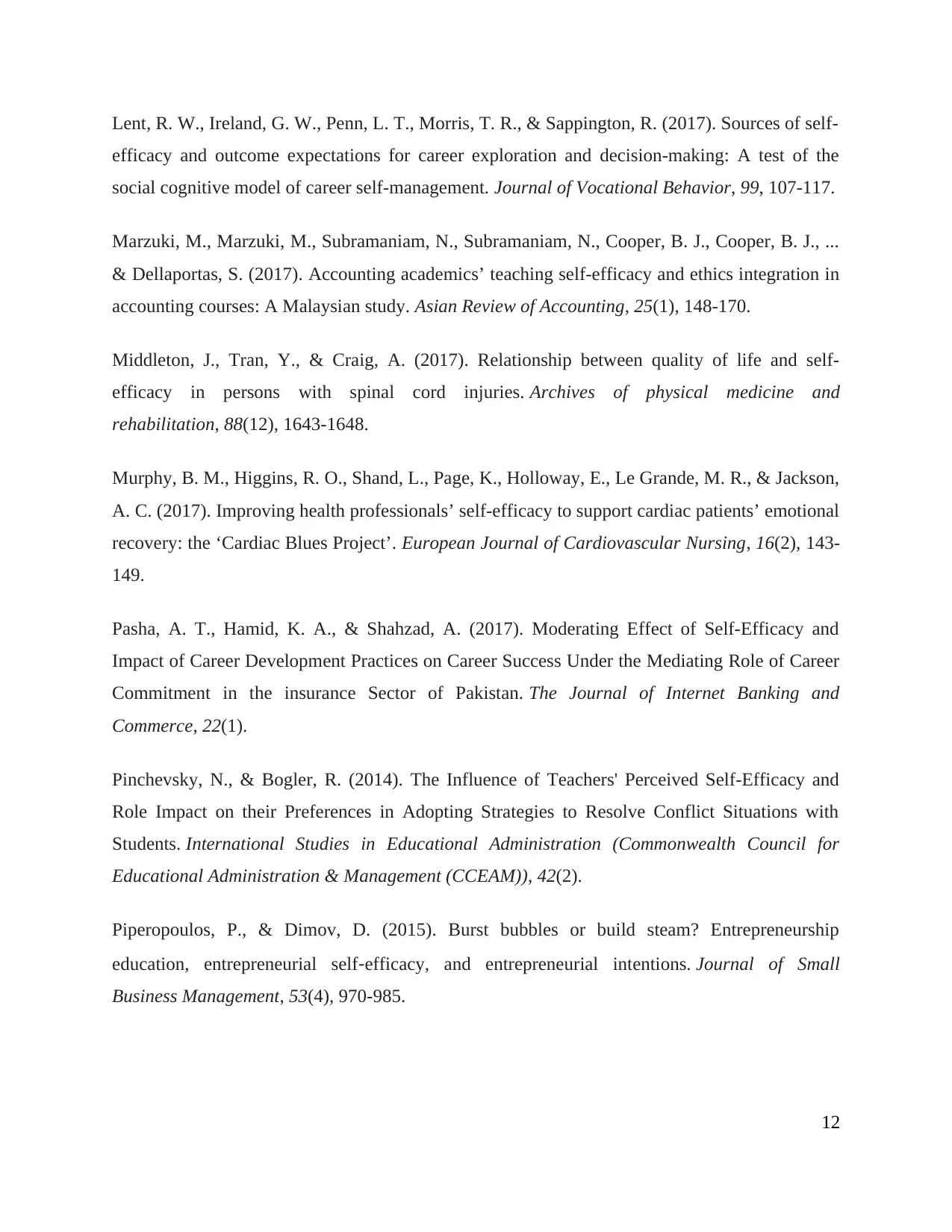
Lent, R. W., Ireland, G. W., Penn, L. T., Morris, T. R., & Sappington, R. (2017). Sources of self-
efficacy and outcome expectations for career exploration and decision-making: A test of the
social cognitive model of career self-management. Journal of Vocational Behavior, 99, 107-117.
Marzuki, M., Marzuki, M., Subramaniam, N., Subramaniam, N., Cooper, B. J., Cooper, B. J., ...
& Dellaportas, S. (2017). Accounting academics’ teaching self-efficacy and ethics integration in
accounting courses: A Malaysian study. Asian Review of Accounting, 25(1), 148-170.
Middleton, J., Tran, Y., & Craig, A. (2017). Relationship between quality of life and self-
efficacy in persons with spinal cord injuries. Archives of physical medicine and
rehabilitation, 88(12), 1643-1648.
Murphy, B. M., Higgins, R. O., Shand, L., Page, K., Holloway, E., Le Grande, M. R., & Jackson,
A. C. (2017). Improving health professionals’ self-efficacy to support cardiac patients’ emotional
recovery: the ‘Cardiac Blues Project’. European Journal of Cardiovascular Nursing, 16(2), 143-
149.
Pasha, A. T., Hamid, K. A., & Shahzad, A. (2017). Moderating Effect of Self-Efficacy and
Impact of Career Development Practices on Career Success Under the Mediating Role of Career
Commitment in the insurance Sector of Pakistan. The Journal of Internet Banking and
Commerce, 22(1).
Pinchevsky, N., & Bogler, R. (2014). The Influence of Teachers' Perceived Self-Efficacy and
Role Impact on their Preferences in Adopting Strategies to Resolve Conflict Situations with
Students. International Studies in Educational Administration (Commonwealth Council for
Educational Administration & Management (CCEAM)), 42(2).
Piperopoulos, P., & Dimov, D. (2015). Burst bubbles or build steam? Entrepreneurship
education, entrepreneurial self‐efficacy, and entrepreneurial intentions. Journal of Small
Business Management, 53(4), 970-985.
12
efficacy and outcome expectations for career exploration and decision-making: A test of the
social cognitive model of career self-management. Journal of Vocational Behavior, 99, 107-117.
Marzuki, M., Marzuki, M., Subramaniam, N., Subramaniam, N., Cooper, B. J., Cooper, B. J., ...
& Dellaportas, S. (2017). Accounting academics’ teaching self-efficacy and ethics integration in
accounting courses: A Malaysian study. Asian Review of Accounting, 25(1), 148-170.
Middleton, J., Tran, Y., & Craig, A. (2017). Relationship between quality of life and self-
efficacy in persons with spinal cord injuries. Archives of physical medicine and
rehabilitation, 88(12), 1643-1648.
Murphy, B. M., Higgins, R. O., Shand, L., Page, K., Holloway, E., Le Grande, M. R., & Jackson,
A. C. (2017). Improving health professionals’ self-efficacy to support cardiac patients’ emotional
recovery: the ‘Cardiac Blues Project’. European Journal of Cardiovascular Nursing, 16(2), 143-
149.
Pasha, A. T., Hamid, K. A., & Shahzad, A. (2017). Moderating Effect of Self-Efficacy and
Impact of Career Development Practices on Career Success Under the Mediating Role of Career
Commitment in the insurance Sector of Pakistan. The Journal of Internet Banking and
Commerce, 22(1).
Pinchevsky, N., & Bogler, R. (2014). The Influence of Teachers' Perceived Self-Efficacy and
Role Impact on their Preferences in Adopting Strategies to Resolve Conflict Situations with
Students. International Studies in Educational Administration (Commonwealth Council for
Educational Administration & Management (CCEAM)), 42(2).
Piperopoulos, P., & Dimov, D. (2015). Burst bubbles or build steam? Entrepreneurship
education, entrepreneurial self‐efficacy, and entrepreneurial intentions. Journal of Small
Business Management, 53(4), 970-985.
12
⊘ This is a preview!⊘
Do you want full access?
Subscribe today to unlock all pages.

Trusted by 1+ million students worldwide
1 out of 13
Related Documents
Your All-in-One AI-Powered Toolkit for Academic Success.
+13062052269
info@desklib.com
Available 24*7 on WhatsApp / Email
![[object Object]](/_next/static/media/star-bottom.7253800d.svg)
Unlock your academic potential
Copyright © 2020–2026 A2Z Services. All Rights Reserved. Developed and managed by ZUCOL.




